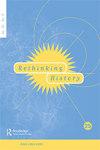马尔萨斯的神圣史:启蒙运动后期的文明史
IF 0.8
2区 历史学
Q1 HISTORY
引用次数: 1
摘要
摘要本文将托马斯·罗伯特·马尔萨斯的《人口原理论》(1798)定位于他那个时代的史学。它通过澄清马尔萨斯利用他对人口-食物动态的描述来重述罗马衰落导致野蛮、封建主义和商业的宏大叙事来做到这一点。马尔萨斯干预的结果是贬低了通常的历史行动者——立法者、王子和政党——的行为以及他们被描绘为行为的历史背景。这种背景通常是根据法律、习俗和政治利益来呈现的,但在马尔萨斯看来,与人类历史的永恒规律相比,这些只是偶然因素。因此,马尔萨斯的散文代表了一个在18世纪末可以发现的更普遍现象的例子:那些追求神学和哲学理解的人对博学多才和源头批评的贬低。本文章由计算机程序翻译,如有差异,请以英文原文为准。
Malthus’s sacred history: outflanking civil history in the late Enlightenment
ABSTRACT This essay locates Thomas Robert Malthus’s Essay on the Principle of Population (1798) in the historiography of his time. It does so by clarifying the manner in which Malthus used his account of population-food dynamics to retell the grand narrative of Roman decline leading to barbarism, feudalism, and then commerce. The result of Malthus’s intervention was to demote in importance both the actions of the usual historical actors – legislators, princes, and parties – and the historical contexts in which they were portrayed as acting. Such contexts were typically rendered in terms of laws, customs, and political interests, but, on Malthus’s account, these are merely contingent factors compared with the eternal laws that underlie human history. Malthus’s Essay thus represents an example of a more general phenomenon detectable in the late eighteenth century: the demotion of erudition and source criticism by those pursuing theological and philosophical understanding.
求助全文
通过发布文献求助,成功后即可免费获取论文全文。
去求助
来源期刊

Rethinking History
Multiple-
CiteScore
1.20
自引率
0.00%
发文量
26
期刊介绍:
This acclaimed journal allows historians in a broad range of specialities to experiment with new ways of presenting and interpreting history. Rethinking History challenges the accepted ways of doing history and rethinks the traditional paradigms, providing a unique forum in which practitioners and theorists can debate and expand the boundaries of the discipline.
 求助内容:
求助内容: 应助结果提醒方式:
应助结果提醒方式:


